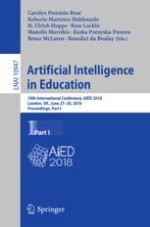2018 | OriginalPaper | Chapter
Connecting the Dots Towards Collaborative AIED: Linking Group Makeup to Process to Learning
Authors : Angela Stewart, Sidney K. D’Mello
Published in: Artificial Intelligence in Education
Publisher: Springer International Publishing
Activate our intelligent search to find suitable subject content or patents.
Select sections of text to find matching patents with Artificial Intelligence. powered by
Select sections of text to find additional relevant content using AI-assisted search. powered by
